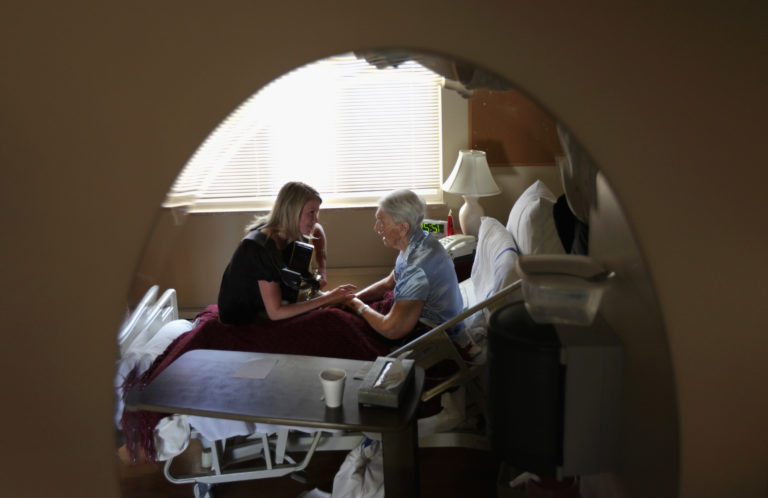
Image by John Moore/Getty Images, © All Rights Reserved.
The Pain of Caregiving and the Privilege of Suffering
No endeavor comes without stress. No matter what we do, at times we will be met with challenges: disagreements, pressures, mistakes, moments of forgetfulness, fatigue, anger — the list goes on. But I’ve seen that we can train ourselves to more skillfully cope with the obstacles that come our way and pull through.
We can learn to observe and identify our challenges, and choose to grow from our mistakes by shifting our thoughts and behaviors when necessary. In other words, we can choose to change our relationship to the challenges we will inevitably undergo by expanding our awareness. From there, we can learn to live a life guided by wisdom, tolerance, and compassion.
It is in this life that we can observe and simply get to know our stress, rather than feel overcome by it. Most importantly, we can learn to begin again without rumination or regret.
Ironically, the importance of cultivating this kind of resilient stance is perhaps most essential for those who already have a strong sense of compassion and purpose in their lives. When we feel a strong emotional investment in the things we are doing and the goals we are making, it can become even more difficult to set healthy boundaries and feel a sense of balance.
In particular, I’m thinking of caregivers. I’ve been leading meditation retreats for caregivers for many years, and I remain fascinated by the work. Whether they are nurses, doctors, hospice workers, therapists or teachers, parents, or adult children taking care of their parents, I’ve always been moved by the fact that individuals in caregiving roles often express at least some feeling of privilege in their work. They tend to describe feeling connected and invested in their role, regardless of how hard it can get, and in spite of inevitable periods of exhaustion.
Even with this strong connection to their work, individuals in caregiving roles face notable challenges in their work that are basically central to the job description. These challenges lead to heartbreak at times, loneliness at other times, and, most often, some amount of burnout. For these reasons, caregiving is a unique kind of work in that it literally requires the practice of compassion, opening one’s heart, on the job. In order to set healthy boundaries with their work and find a sustainable way to practice self-care amidst caring for others, cultivating resilience is especially crucial for caregivers.
I recently co-led a retreat for caregivers, along with Ali Smith, Atman Smith, and Andy Gonzalez of the Holistic Life Foundation. Ali and Atman are brothers. Their parents were into yoga and meditation, and taught them these practices from an early age. They describe themselves as the “weird vegan kids” who would have to bring soy hotdogs to friends’ parties.
They grew up in inner-city Baltimore, which, at the time, felt like a safe and connected community, with neighbors looking out for one another. The brothers met up with Andy in college (drinking at a bar seemed to have been involved) and they soon formed a book club, and together focused on their spiritual lives. After college, when they all decided to move back to the inner city, they found it had been riven by crack, gangs, and despair.
Today Ali, Atman, and Andy work to bring the tools of yoga and meditation to schools there. They work directly with the children, and now — their first program started 12 years ago — some of their first students are the teachers of their ever-expanding program. (One of them, Jamal, came on our retreat to assist.) They see the effect of their work on teachers, and on parents.
Inevitably they are working with people who consider themselves caregivers, and they chose the topic for our retreat. Given their expertise, there were a number of people attending who worked in schools: teachers, guidance counselors, and administrators. Inevitably, there were also people who play caregiving roles in their personal lives — people taking care of elderly or ill parents, parents of children on the autism spectrum, and representatives of the famous “sandwich generation,” who were taking care of both their parents and kids. These last were often the ones nodding off the most during meditation. Who could blame them?
I, too, consider myself privileged to be able to work with people who are, in a way, on the front lines of suffering. Many, if not most, of my students arrive to meditation from places of distress. I’ve seen that meditation can be a especially valuable tool for caregivers, and the particular suffering they face in their work. The practice of meditation encourages us to become aware of our experiences and feelings, rather than trying to “fix” them. Meditation opens our mind and deepens our courage. It invites us to find greater emotional freedom. It allows us to cut through the differentiations of you-vs-me, us-vs-them. It reminds us all, caregivers and non-caregivers alike, that our basic drive as humans is to be happy.
But how?
It is essential for those in caregiving roles to cultivate self-compassion alongside compassion for others, to create an inner atmosphere of kindness, expansiveness, and awareness in which resilience can flourish. It’s unrealistic to think that anyone can endlessly overlook his or her own needs, and still have the energy and commitment to give fully to others. Even those in professional caregiving roles. Plus, when we are spread too thin, we typically feel a greater tendency to self-isolate rather than to connect. Compassionate caregiving depends on connection.
There is something about just “being with” that is such a fundamental part of sustainable caregiving. Recognizing our fundamental inability to fix, and being able to simply make ourselves available, is something we can learn to do — and to be OK with — as a result of tapping into the power of self-compassion. Acceptance is the energetic opposite of aversion, anger, and fear. It is expansive and warm as opposed to restrictive, imploding, and frozen —, all qualities that we typically encounter when we fixate on the need to fix, to control.
It’s essential for caregivers to consider how they are approaching the art of giving, which is a process that mindfulness can help clarify. Pure generosity emerges when we give without the need for our offering to be received in a certain way. That’s why the best kind of generosity comes from inner abundance, rather than from feeling deficient and hollow, starved for validation.
Sure, there are plenty of people who feel love and compassion for others, but are not able to accept and give care and love to themselves. But this mode of being is just not sustainable. In this kind of situation, care and love cannot be freely given gifts but rather have lots of strings attached, paving the way for resentment and burnout.
Caregiving with resilience first depends on choosing to inhabit a world where we treat ourselves with love, where we know deeply and truly that compassion for ourselves is not weak or self-defeating or an excuse for surrender or passivity. Rather, it is a force that opens the door to a completely different way of relating to others and to our own experience so we constantly grow and change, and continue to serve.


Share your reflection